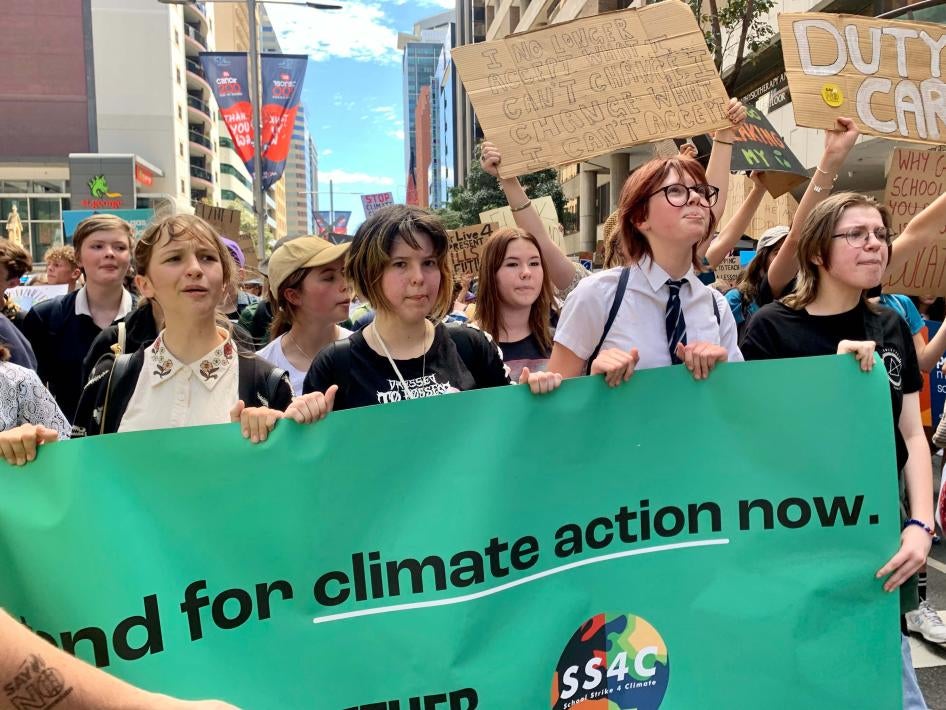(Sydney) – The Australian government’s failure to take ambitious climate action and its support for the fossil fuel industry contributes to the global climate crisis and mars the country’s human rights record, Human Rights Watch said today in its World Report 2022.
For the first time, Human Rights Watch is including a Climate Change Policy and Impacts section as part of the organization’s annual assessment of Australia’s human rights record. Among other concerns, Indigenous Australians remain significantly overrepresented in the criminal justice system.
“The global climate crisis is a human rights crisis and Australia, as one of the world's biggest per capita emitters of greenhouse gases, is failing to meet its global responsibilities,” said Sophie McNeill, Australia researcher at Human Rights Watch. “The Australian government should rapidly reduce emissions and stop subsidizing fossil fuels to prevent the most catastrophic climate outcomes.”
752-page World Report 2022, its 32nd edition, Human Rights Watch reviews human rights practices in nearly 100 countries. Executive Director Kenneth Roth challenges the conventional wisdom that autocracy is ascendent. In country after country, large numbers of people have recently taken to the streets, even at the risk of being arrested or shot, showing that the appeal of democracy remains strong. Meanwhile, autocrats are finding it more difficult to manipulate elections in their favor. Still, he says, democratic leaders must do a better job of meeting national and global challenges and of making sure that democracy delivers on its promised dividends.
The climate crisis poses a serious risk to the fundamental rights to life, health, food, and an adequate standard of living of individuals and communities across the world. Governments have a human rights obligation to reduce the greenhouse gas emissions that are driving it.
In 2021 the Australian government continued to actively support the expansion of fossil fuel industries at the expense of renewables, approving several new coal mines including projects requiring public financing.
Fossil fuel companies in Australia, the third-largest exporter of fossil fuels globally, benefit from significant tax breaks, with fossil fuel subsidies having increased 48 percent since the Paris Agreement on climate in 2015.
In October 2021, just days before the COP26 climate conference in Glasgow, the Australian government announced it had set a target for net zero carbon emissions by 2050. However, this did not include a commitment to end fossil fuels, and the government did not set a 2030 target or reveal how it would achieve this target.
In terms of the country’s criminal justice system, Aboriginal and Torres Strait Islander people comprise 30 percent of Australia’s adult prison population, but just 3 percent of the national population. Indigenous children are 17 times more likely to be incarcerated than non-Indigenous children. At least 13 Indigenous people died in custody in Australia in 2021.
In January, Australia disregarded calls by 31 United Nations member countries that recommended the government raise the age of criminal responsibility from 10 to the internationally recommended minimum of 14. In November, state attorneys-general committed to developing a proposal to increase the minimum age of criminal responsibility to 12, which still does not meet UN standards.
It has been eight years since the Australian government reintroduced offshore processing of asylum seekers who arrive by boat. Several hundred people transferred to Nauru or Papua New Guinea remain there, while others transferred to Australia for medical reasons are in limbo in detention, or on visas that do not provide a pathway to permanent protection.








